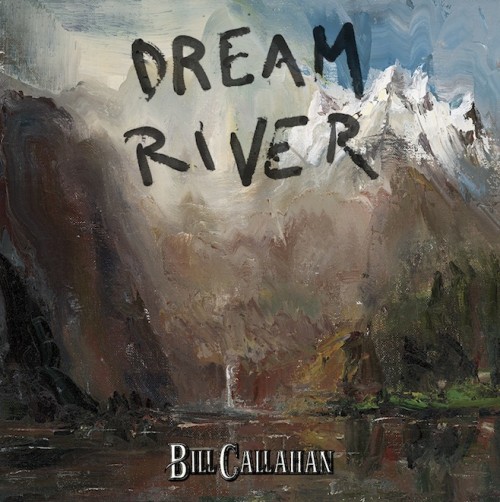
Bill Callahan
Dream River
(Drag City)
Rating: 4 out of 5 stars
Videos by American Songwriter
On “America!”, a standout track from his 2011 album Apocalypse, Bill Callahan saluted, in his warm, inimitable baritone, to “Captain Kristofferson,” “Buck Sergeant Newbury,” “‘Leatherneck’ Jones” and “Sergeant Cash.” As tributes to heroes go, it reflects both a reverence and appreciation for kitsch that’s entirely in character for a songwriter like Callahan. Yet, were the 47-year-old singer to have been born a few decades earlier, he could have easily been peers with greats like Mickey Newbury or Kris Kristofferson. Over 25 years and 14 albums — not to mention a few self-released cassettes — Callahan has undergone an evolution from making a cozy home in tape-hiss static as Smog, to maturing into a poetic, masculine crooner, carrying the torch of his fantasy-league army buddies while finding his own voice as an irreverent, albeit authoritative storyteller.
Dream River, Callahan’s 14th album — or fourth, since dropping the Smog mantle — initially feels of a similar vintage as recent albums like Sometimes I Wish We Were An Eagle or Apocalypse, as leadoff track “The Sing” moseys in on a slow shuffle and the rustic weep of a violin. There’s a gentle, yet lush Americana arrangement backing Callahan as he paints a portrait of a late night drink in a hotel bar, observing, “The only words I’ve said today are ‘beer’ and ‘thank you.’” Shortly thereafter, Callahan’s drink order becomes an almost Zen-like mantra as he repeats the couplet, “Beer/ thank you.”
As the album draws on, however, Callahan delves into a more sumptuous and soulful sound, his gentle strums becoming dreamier jazz-fusion riffs, and soft drum shuffles morphing into jazzy, Latin rhythms on tracks like the vibrant “Javelin Unlanding.” And with this transformation, Callahan doesn’t evoke the likes of Johnny Cash so much as the smoky, sexy feel of Tim Buckley’s Happy Sad. Though Callahan isn’t quite as wild and expressive as Buckley was known to be during his short career, his deep voice and attention to richly textured sounds suits this approach splendidly.
In its strongest moments — though there are no real weak moments to speak of — Dream River presents a compelling, gorgeous sonic world in which to get blissfully lost. “Spring” is one such song, with hypnotic layers of guitar that swirl like opium smoke in some dark, luxurious boudoir. It has more of a lightly psychedelic feel than an erotic one, per se, but it speaks the language of the loins all the same. In one of its most intense, climactic moments, Callahan sings, “And all I wanna do/ Is make love to you/ In the fertile dirt/ With a careless mind.” All that’s missing is the post-coital cigarette.
Even more awe-inspiring is the gorgeous “Summer Painter,” in which Callahan juxtaposes a tale about a summer job painting boats with a cool, atmospheric arrangement that builds to an eruption of feverish intensity. Through its intoxicating mist, Callahan spins an epic yarn that extends from maritime superstition (“For luck you keep the same first letter/ You don’t want… bad luck at sea”) to reflections on class and privilege (“Rich man’s folly and poor man’s dream/ I painted these… I never truly knew who I was working for anyway, the rich or the poor/ Who am I working for?”). It’s as powerful a song as Callahan has ever written, which is no small feat — his catalog is pretty rich as it is.
Given the musical distance that Callahan has traveled since layering inscrutable folk songs with boombox-queued samples on albums like 1993’s Julius Caesar, the stylistic variations on Dream River don’t represent a total reinvention so much as a different shade within a similar spectrum. It’s a beautiful album on first listen, and each subsequent spin, but as with any of Bill’s recordings, offers deeper layers meaning and detail to unpack with each new drop of the needle. Dream River, as with its recent predecessors, represents a stunning maturity for the singer. Commercially, he’s unlikely to ever be a part of mainstream culture in the same way that Johnny Cash or George Jones were, but here, he continues to prove himself every bit the American musical treasure that his own personal influences were and are.
As Dream River draws to a close on the gorgeously laid-back “Winter Road,” Callahan croons, “When things are beautiful, you just keep on.” Good advice, that — keep on, Sergeant Callahan.













Leave a Reply
Only members can comment. Become a member. Already a member? Log in.